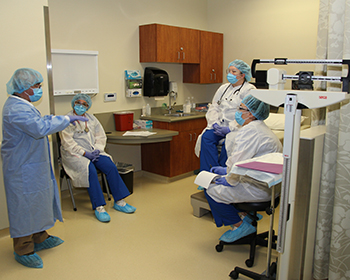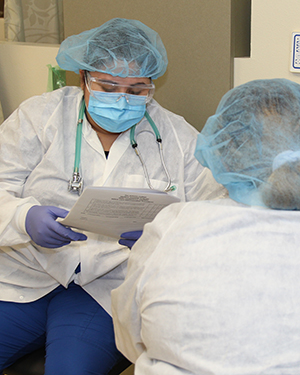Medical Assisting Students Learn Viral Lessons During Pandemic
July 20, 2020
Emily Willis was not spending her summer the way she had planned. Rather than taking a vacation after the spring semester or looking for a job in her new career, she found herself back on SAC’s campus finishing her academic work in the medical assisting program.
 Twice-a-week, she would return to the Nursing and Allied Health Complex and go through a strict protocol that included temperature checks, suiting up in personal protective equipment (PPE), and thorough handwashing to go to class.
Twice-a-week, she would return to the Nursing and Allied Health Complex and go through a strict protocol that included temperature checks, suiting up in personal protective equipment (PPE), and thorough handwashing to go to class.
In a field directly related to the health industry, Willis and her fellow students found themselves getting a lesson on dealing with a major medical crisis.
“Getting a taste of a global pandemic has not changed my views on going into this field. It's made my respect for healthcare and frontline workers that much greater,” she said, adding, “I think we are in the proper field to deal with this pandemic.”
Luis Vega-Maldonado, program coordinator for medical assisting, agrees it is an integral part of the medical community. “Medical assisting jobs are increasing faster than average. Many clinics hire these highly skilled students to fill positions that in the old days were filled by nurses,” he said. “These students are able to enter any variety of different medical settings since their training is geared towards a generalized knowledge.”
Like the rest of the college, the medical assisting program was caught off guard when it was announced the students would not return to campus after spring break. The program requires hands-on skill training that could not be taught remotely. After serious consideration, it was decided all students would be given an incomplete for the spring semester with the understanding that the training to complete the course would have to be finished before the start of the fall 2020 term.
 Fortunately, the college allowed the medical assisting program – along with dental assisting and the emergency medical technician programs – to continue into the first summer session.
Fortunately, the college allowed the medical assisting program – along with dental assisting and the emergency medical technician programs – to continue into the first summer session.
Vega-Maldonado said the new health and safety protocols to return to campus were seen as a learning tool.
“These students were able to experience what it is like to work under very strict control conditions and gain valuable lessons on how serious a pandemic can be,” he said. “Using PPE for long periods of time can be very uncomfortable since it gets very hot wearing those items.”
He praised his students for the additional work they delivered to complete the program.
“The students were wonderful, the pandemic did interrupt their plans, but they responded well and with enthusiasm,” he said.
“We've managed to make it work and I think that only made us stronger as individuals” added Willis.
–SAC–
